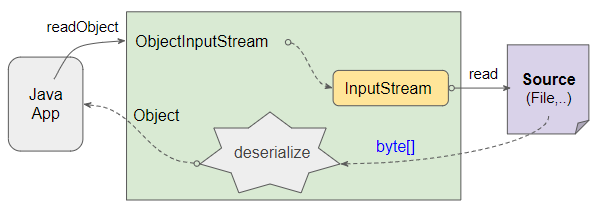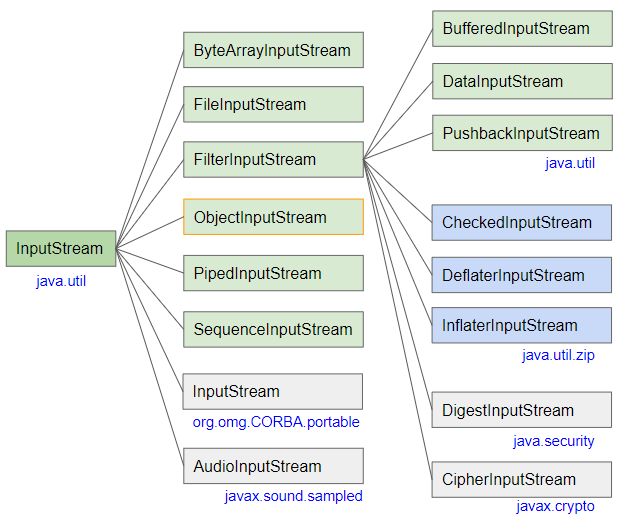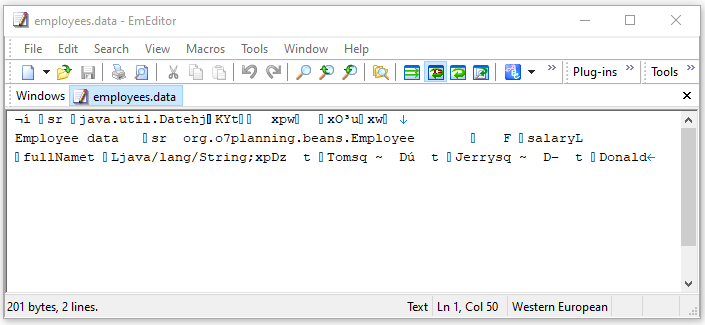Le Tutoriel de Java ObjectInputStream
1. ObjectInputStream
ObjectInputStream est une sous-classe de la classe InputStream, qui gère un objet InputStream et fournit des méthodes pour lire des données primitives ou un objet à partir d'InputStream qu'il gère.

public class ObjectInputStream
extends InputStream implements ObjectInput, ObjectStreamConstantsObjectInputStream est utilisé pour lire les sources de données écrites par ObjectOutputStream.

- InputStream
- FileInputStream
- ByteArrayInputStream
- PushbackInputStream
- PipedInputStream
- SequenceInputStream
- BufferedInputStream
- DataInputStream
- FilterInputStream
- AudioInputStream
- InflaterInputStream
- DigestInputStream
- DeflaterInputStream
- CipherInputStream
- CheckedInputStream
ObjectInputStream methods
public boolean readBoolean() throws IOException
public byte readByte() throws IOException
public int readUnsignedByte() throws IOException
public char readChar() throws IOException
public short readShort() throws IOException
public int readUnsignedShort() throws IOException
public int readInt() throws IOException
public long readLong() throws IOException
public float readFloat() throws IOException
public double readDouble() throws IOException
public void readFully(byte[] buf) throws IOException
public void readFully(byte[] buf, int off, int len) throws IOException
public int skipBytes(int len) throws IOException
public String readUTF() throws IOException
public final ObjectInputFilter getObjectInputFilter()
public final void setObjectInputFilter(ObjectInputFilter filter)
public final Object readObject() throws IOException, ClassNotFoundException
public Object readUnshared() throws IOException, ClassNotFoundException
public void defaultReadObject() throws IOException, ClassNotFoundException
public ObjectInputStream.GetField readFields() throws IOException, ClassNotFoundException
public void registerValidation(ObjectInputValidation obj, int prio) throws NotActiveException, InvalidObjectException
protected Class<?> resolveClass(ObjectStreamClass desc) throws IOException, ClassNotFoundException
protected Object readObjectOverride() throws IOException, ClassNotFoundException
protected Class<?> resolveProxyClass(String[] interfaces) throws IOException, ClassNotFoundException
protected Object resolveObject(Object obj) throws IOException
protected boolean enableResolveObject(boolean enable) throws SecurityException
protected void readStreamHeader() throws IOException, StreamCorruptedException
protected ObjectStreamClass readClassDescriptor() throws IOException, ClassNotFoundException
String readTypeString() throws IOException
// Methods inherited from InputStream:
public int read() throws IOException
public int read(byte[] buf, int off, int len) throws IOException
public int available() throws IOException
public void close() throws IOExceptionObjectInputStream constructors
public ObjectInputStream(InputStream in)2. Example 1
Dans cet exemple, on va écrire des objets Employee dans un fichier, puis utiliser ObjectInputStream pour lire le fichier.
La classe Employee doit implémenter une interface Serializable, ce qui est nécessaire pour qu'elle puisse être écrite dans un ObjectOutputStream.
Employee.java
package org.o7planning.beans;
import java.io.Serializable;
public class Employee implements Serializable {
private static final long serialVersionUID = 1L;
private String fullName;
private float salary;
public Employee(String fullName, float salary) {
this.fullName = fullName;
this.salary = salary;
}
public String getFullName() {
return fullName;
}
public void setFullName(String firstName) {
this.fullName = firstName;
}
public float getSalary() {
return salary;
}
public void setSalary(float lastName) {
this.salary = lastName;
}
}Ensuite, utiliser ObjectOutputStream pour écrire les objets Employee dans le fichier.
WriteEmployeeDataEx.java
package org.o7planning.objectinputstream.ex;
import java.io.File;
import java.io.FileOutputStream;
import java.io.IOException;
import java.io.ObjectOutputStream;
import java.io.OutputStream;
import java.util.Date;
import org.o7planning.beans.Employee;
public class WriteEmployeeDataEx {
// Windows: C:/Data/test/employees.data
private static String file_path = "/Volumes/Data/test/employees.data";
public static void main(String[] args) throws IOException {
File outFile = new File(file_path);
outFile.getParentFile().mkdirs();
Employee e1 = new Employee("Tom", 1000f);
Employee e2 = new Employee("Jerry", 2000f);
Employee e3 = new Employee("Donald", 1200f);
Employee[] employees = new Employee[] { e1, e2, e3 };
OutputStream os = new FileOutputStream(outFile);
ObjectOutputStream oos = new ObjectOutputStream(os);
System.out.println("Writing file: " + outFile.getAbsolutePath());
oos.writeObject(new Date());
oos.writeUTF("Employee data"); // Some informations.
oos.writeInt(employees.length); // Number of Employees
for (Employee e : employees) {
oos.writeObject(e);
}
oos.close();
System.out.println("Finished!");
}
}Après avoir exécuté la classe WriteEmployeeDataEx, on obtient un fichier avec un contenu déroutant.

Enfin, utiliser ObjectInputStream pour lire le fichier qui vient d'être écrit à l'étape précédente.
ReadEmployeeDataEx.java
package org.o7planning.objectinputstream.ex;
import java.io.File;
import java.io.FileInputStream;
import java.io.IOException;
import java.io.InputStream;
import java.io.ObjectInputStream;
import java.util.Date;
import org.o7planning.beans.Employee;
public class ReadEmployeeDataEx {
// Windows: C:/Data/test/employees.data
private static String file_path = "/Volumes/Data/test/employees.data";
public static void main(String[] args) throws IOException, ClassNotFoundException {
File inFile = new File(file_path);
InputStream is = new FileInputStream(inFile);
ObjectInputStream ois = new ObjectInputStream(is);
System.out.println("Reading file: " + inFile.getAbsolutePath());
System.out.println();
Date date = (Date) ois.readObject();
String info = ois.readUTF();
System.out.println(date);
System.out.println(info);
System.out.println();
int employeeCount = ois.readInt();
for(int i=0; i< employeeCount; i++) {
Employee e = (Employee) ois.readObject();
System.out.println("Employee Name: " + e.getFullName() +" / Salary: " + e.getSalary());
}
ois.close();
}
}Output:
Reading file: /Volumes/Data/test/employees.data
Sat Mar 20 18:54:24 KGT 2021
Employee data
Employee Name: Tom / Salary: 1000.0
Employee Name: Jerry / Salary: 2000.0
Employee Name: Donald / Salary: 1200.03. readFields()
Supposons que vous utilisiez ObjectInputStream pour lire un objet GameSetting à partir d'un fichier. En même temps, lors de la lecture de l'objet GameSetting, vous souhaitez modifier les valeurs de certains de ses champs (filed).
GameSetting.java
package org.o7planning.beans;
import java.io.IOException;
import java.io.ObjectInputStream;
public class GameSetting implements java.io.Serializable {
private static final long serialVersionUID = 1L;
private int sound;
private int bightness;
private String difficultyLevel;
private String userNote;
public GameSetting(int sound, int bightness, String difficultyLevel, String userNote) {
this.sound = sound;
this.bightness = bightness;
this.difficultyLevel = difficultyLevel;
this.userNote = userNote;
}
public int getSound() {
return sound;
}
public int getBightness() {
return bightness;
}
public String getDifficultyLevel() {
return difficultyLevel;
}
public String getUserNote() {
return userNote;
}
// Do not change name and parameter of this method.
private void readObject(ObjectInputStream in) throws IOException, ClassNotFoundException {
ObjectInputStream.GetField fields = in.readFields();
this.sound = fields.get("sound", 50);
this.bightness = fields.get("bightness", 50);
// Edit fields
this.difficultyLevel = (String) fields.get("difficultyLevel", "Easy"); // Default
if (this.difficultyLevel == null) {
this.difficultyLevel = "Easy";
}
this.userNote = (String) fields.get("userNote", "Have fun!"); // Default
if (this.userNote == null) {
this.userNote = "Have fun!";
}
}
}ObjectInputStream_readFields.java
package org.o7planning.objectinputstream.ex;
import java.io.File;
import java.io.FileInputStream;
import java.io.FileOutputStream;
import java.io.IOException;
import java.io.InputStream;
import java.io.ObjectInputStream;
import java.io.ObjectOutputStream;
import java.io.OutputStream;
import java.util.Date;
import org.o7planning.beans.GameSetting;
public class ObjectInputStream_readFields {
// Windows: C:/Data/test/game_setting.data
private static String file_path = "/Volumes/Data/test/game_setting.data";
public static void main(String[] args) throws IOException, ClassNotFoundException {
GameSetting setting = new GameSetting(10, 80, null, null);
writeGameSetting(setting);
readGameSetting();
}
private static void writeGameSetting(GameSetting setting) throws IOException {
File file = new File(file_path);
file.getParentFile().mkdirs();
OutputStream os = new FileOutputStream(file);
ObjectOutputStream oos = new ObjectOutputStream(os);
// Write a String
oos.writeUTF("Game Settings, Save at " + new Date());
// Write Object
oos.writeObject(setting);
oos.close();
}
private static void readGameSetting() throws IOException, ClassNotFoundException {
File file = new File(file_path);
file.getParentFile().mkdirs();
InputStream is = new FileInputStream(file);
ObjectInputStream ois = new ObjectInputStream(is);
// Read a String
String info = ois.readUTF();
// Read fields
GameSetting setting = (GameSetting) ois.readObject();
System.out.println("sound: " + setting.getSound());
System.out.println("bightness: " + setting.getBightness());
System.out.println("difficultyLevel: " + setting.getDifficultyLevel());
System.out.println("userNote: " + setting.getUserNote()); // null.
ois.close();
}
}Output:
sound: 10
bightness: 80
difficultyLevel: Easy
userNote: Have fun!4. readUnshared()
La méthode ObjectInputStream.readUnshared() est utilisée pour lire un objet déjà écrit par la méthode ObjectOutputStream.writeUnshared(Object).
ObjectInputStream_readUnshared.java
package org.o7planning.objectinputstream.ex;
import java.io.File;
import java.io.FileInputStream;
import java.io.FileOutputStream;
import java.io.IOException;
import java.io.InputStream;
import java.io.ObjectInputStream;
import java.io.ObjectOutputStream;
import java.io.OutputStream;
import java.util.ArrayList;
public class ObjectInputStream_readUnshared {
// Windows: C:/Data/test/test1.data
private static String file_path = "/Volumes/Data/test/test.data";
public static void main(String[] args) throws IOException, ClassNotFoundException {
writeUnsharedTest();
readUnsharedTest();
}
private static void writeUnsharedTest() throws IOException {
File file = new File(file_path);
file.getParentFile().mkdirs();
ArrayList<String> list = new ArrayList<String>();
list.add("One");
list.add("Two");
OutputStream os = new FileOutputStream(file);
ObjectOutputStream oos = new ObjectOutputStream(os);
oos.writeUnshared(list); // Write the first time
oos.writeUnshared(list); // Write the second time
oos.close();
}
@SuppressWarnings({ "unchecked" })
private static void readUnsharedTest() throws IOException, ClassNotFoundException {
File file = new File(file_path);
ArrayList<String> list = new ArrayList<String>();
list.add("One");
list.add("Two");
InputStream is = new FileInputStream(file);
ObjectInputStream ois = new ObjectInputStream(is);
ArrayList<String> list1 = (ArrayList<String>) ois.readUnshared();
ArrayList<String> list2 = (ArrayList<String>) ois.readUnshared();
System.out.println("list1 == list2? " + (list1 == list2));
ois.close();
}
}Output:
list1 == list2? falseVoir plus d'explication sur la méthode ObjectOutputStream.writeUnshared(Object):
Tutoriels Java IO
- Le Tutoriel de Java CharArrayWriter
- Le Tutoriel de Java FilterReader
- Le Tutoriel de Java FilterWriter
- Le Tutoriel de Java PrintStream
- Le Tutoriel de Java BufferedReader
- Le Tutoriel de Java BufferedWriter
- Le Tutoriel de Java StringReader
- Le Tutoriel de Java StringWriter
- Le Tutoriel de Java PipedReader
- Le Tutoriel de Java LineNumberReader
- Le Tutoriel de Java PushbackReader
- Le Tutoriel de Java PrintWriter
- Tutoriel sur les flux binaires Java IO
- Le Tutoriel de Java IO Character Streams
- Le Tutoriel de Java BufferedOutputStream
- Le Tutoriel de Java ByteArrayOutputStream
- Le Tutoriel de Java DataOutputStream
- Le Tutoriel de Java PipedInputStream
- Le Tutoriel de Java OutputStream
- Le Tutoriel de Java ObjectOutputStream
- Le Tutoriel de Java PushbackInputStream
- Le Tutoriel de Java SequenceInputStream
- Le Tutoriel de Java BufferedInputStream
- Le Tutoriel de Java Reader
- Le Tutoriel de Java Writer
- Le Tutoriel de Java FileReader
- Le Tutoriel de Java FileWriter
- Le Tutoriel de Java CharArrayReader
- Le Tutoriel de Java ByteArrayInputStream
- Le Tutoriel de Java DataInputStream
- Le Tutoriel de Java ObjectInputStream
- Le Tutoriel de Java InputStreamReader
- Le Tutoriel de Java OutputStreamWriter
- Le Tutoriel de Java InputStream
- Le Tutoriel de Java FileInputStream
Show More